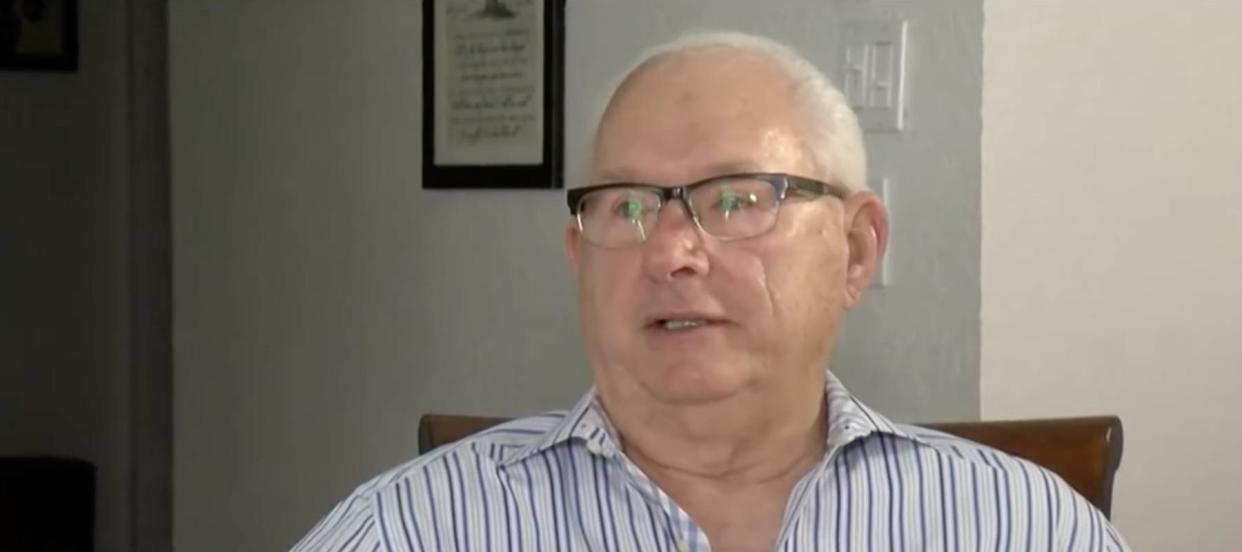Florida man ordered to pay back $20K for SBA loan he never borrowed — or Social Security will cut his benefits

Joseph Carpenter, 76, a military veteran living in Tampa Bay, Florida, received an alarming letter from the Small Business Administration (SBA) earlier this month.
The letter claims he took out a $20,000 SBA loan in 2021, and it was time to pay it back.
Don't miss
Commercial real estate has beaten the stock market for 25 years — but only the super rich could buy in. Here's how even ordinary investors can become the landlord of Walmart, Whole Foods or Kroger
Car insurance premiums in America are through the roof — and only getting worse. But 5 minutes could have you paying as little as $29/month
These 5 magic money moves will boost you up America's net worth ladder in 2024 — and you can complete each step within minutes. Here's how
The problem? Carpenter never took out a loan. In theory, the error should be an easy fix, since the SBA knows where they sent the loan payment.
However, instead of rectifying its mistake, the SBA is now demanding that Carpenter prove he didn't take out the loan. If he fails to do so, the SBA will garnish up to 15% of his Social Security retirement benefits.
“There are all those loans out there,” Carpenter told WFLA News Channel 8. “They’re going to make you do the work. They’re not going to do the work. They put the burden of proof on the person they’re accusing of having the loan.”
The veteran has filed a complaint with the inspector general.
For retirees like Carpenter, who rely on Social Security benefits, losing 15% of their income could mean the difference between making ends meet or struggling to cover basic necessities.
But what are his options — and what can other Americans do if they find themselves in a similar situation?
What are SBA loans?
The Small Business Administration (SBA) is a federal agency that provides expertise, counseling, and loans to help Americans build or grow their small businesses.
During the pandemic, some of those loans included COVID-19 EIDLs, EIDL Targeted Advances, Supplemental Targeted Advances, and PPP loans. Many of these loans were forgiven if the borrower met specific requirements, such as only using the funds to cover payroll costs.
However, during the pandemic, the SBA streamlined its loan requirements, leading to a significant increase in fraudulent activity.
According to the Office of the Inspector General, the SBA disbursed more than $200 billion in potentially fraudulent loans during the pandemic.
Fraudsters applied for loans using other people's information and received the funds, leaving victims like Carpenter to pick up the pieces when the SBA tried to reclaim the funds.
Read more: Car insurance rates have spiked in the US to a stunning $2,150/year — but you can be smarter than that. Here's how you can save yourself as much as $820 annually in minutes (it's 100% free)
How much of your Social Security benefits can the SBA take?
The SBA (through the Department of Treasury) can garnish up to 15% of your Social Security benefits if you default on a legitimate SBA loan. This is referred to as “offset.”
This limit was set in the Debt Collection Improvement Act, but there are additional protections in place.
Let’s say you receive $1,000 a month. You could lose $150. However, by statute, your benefits of up to $9,000 a year — or $750 per month — are protected from garnishment, according to SBA-Attorneys.com.
Consider this example provided by the Bureau of the Fiscal Service: if the debtor receives $850 per month in Social Security benefits, the “offset” amount is the lesser of $127.50 (which is 15% of $850) or $100 — the amount by which the monthly benefit exceeds $750.
In this scenario, let’s say the debt is at least $100. Then the amount which can be “offset” is $100 per month.
This limit is designed to reduce hardship, but it can still create financial challenges for those on a fixed income.
What to do if you're billed for a fraudulent SBA loan
Carpenters's case is particularly frustrating because the SBA is asking him to prove that something didn't happen. However, there are steps you can take if you’re facing a similar challenge.
The Federal Trade Commission (FTC) recommends reaching out to SBA’s Office of Disaster Assistance and asking for support.
You can also submit a FOIA (Freedom of Information Act) request for the loan application and any additional related documents.
Next, check your credit report for unfamiliar accounts or unusual activity. Close any accounts you don't recognize and report them to lenders and IdentityTheft.gov.
Filing a report with the Consumer Protection Bureau (CFPB) may also help.
Finally, consider seeking legal representation, especially if the situation escalates, as it did for Carpenter.
What to read next
Unlock access to 4,700+ hand-picked, single-family homes across America — and the juicy rental cash they can generate. Here's how to start with as little as $10
‘You didn’t want to risk it’: 80-year-old woman from South Carolina is looking for the safest place for her family’s $250,000 savings. Here's Dave Ramsey's response
Rich young Americans have lost confidence in the stock market — and are betting on these assets instead. Get in now for strong long-term tailwinds
This article provides information only and should not be construed as advice. It is provided without warranty of any kind.
